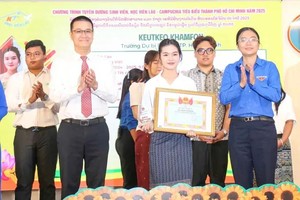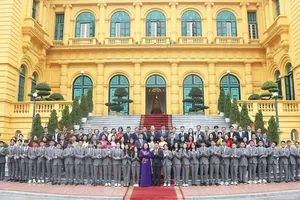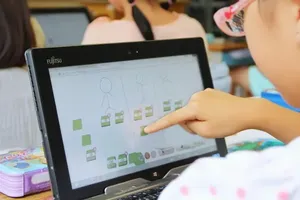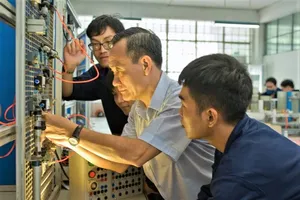The Government has assigned the Ministry of Education and Training to closely coordinate with the HCMC People's Committee to develop a project to turn the city into an international center for education and training to attract students from the Southeast Asia region and the world.
The Ministry of Education and Training has issued a plan to implement a resolution of the Government's action program on the development of HCMC by 2030, with a vision to 2045.
 |
The artificial intelligence (AI) Education and Training center at the Vietnam National University - HCMC in Thu Duc City. — VNS Photo |
The plan to concretise tasks and solutions in the field of education and training is stated in the resolution on the Government's action program.
The ministry has asked its agencies and units to focus on the main goals and solutions stated in the resolution to deploy important tasks in the field of education and training, including the coordination with the municipal People's Committee to turn the city into a large center of high-quality education and training.
It has required them to focus on training high-quality human resources, approaching the international level, adapting and taking advantage of digital transformation, innovation and international integration.
More attention must be paid to investment in replacing unqualified classrooms and upgrading educational equipment of educational facilities at all levels of education, and relocating educational institutions out of the inner districts.
The Government also assigned the Ministry of Education and Training to assume the prime responsibility for, and coordinate with the HCMC People's Committee and relevant ministries and agencies to relocate universities out of the inner city.
Facilities of the relocated universities will be used for the development of scientific research and international cooperation of higher education institutions.
A recent report by the People's Committee on Education and training in 2011-22 and the tasks ahead says it has made efforts to guarantee education to all and eradicate illiteracy.
The city has more than 2,300 educational facilities from kindergarten to high school, and nearly 1,800 continuing education centers.
It hopes to ensure that by 2030 national educational standards are met at 60 percent of kindergartens, 80 percent of primary schools, 70 percent of secondary schools, and 50 percent of public high schools.
Thu Duc City and the 21 districts in the city are trying to ensure 100 percent of local schools are developed under the smart school model.
They also hope to have at least two schools at each level offering high-quality education.
Schools at all levels will have no more than 35 students in a classroom while all primary schools, 70 percent of secondary schools and 80 percent of high schools will have two shifts a day.
At the pre-school level, the plan is to have at least one smart classroom in each school, all teachers to have the required educational qualifications and all students to get acquainted with English.
To ensure fairness, the city will give priority to the needs of students in island and suburban areas, orphans and those with disabilities or in difficult circumstances.
The city has ensured that at least 20 percent of its budget is consistently spent on education and training.
It is also home to the leading higher educational institutions in the country, with more than 100 universities and colleges, and about 410 vocational schools.
Among them, the Vietnam National University-HCMC (VNU-HCM) aims to be among the leading higher education institutions in Asia.
VNU-HCM has been leading the country in the number of training programs meeting international accreditation standards, with 110 programs.
























